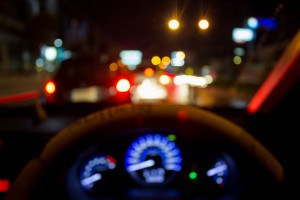Safety Tips for Nighttime Driving
 Did you know that traffic death rates are three times greater at night than during the day? The National Safety Council reports that there are some unique hazards that come with night driving that many drivers are completely unaware of or simply feel impervious to.
Did you know that traffic death rates are three times greater at night than during the day? The National Safety Council reports that there are some unique hazards that come with night driving that many drivers are completely unaware of or simply feel impervious to.
The principle and most obvious hazard associated with night driving is the darkness. A driver’s ability to operate a motor vehicle and respond to what is going on around them depends on vision, and naturally, the darkness limits vision significantly. A driver’s depth perception, reaction time, peripheral vision, and their ability to perceive color differences are dramatically impaired at night.
The age of the driver also has a significant impact on the ability to see clearly enough to drive at night. The older the driver, the more light he or she requires in order to see clearly in the dark. Teen drivers are more likely to crash when they are driving after dark according to a Centers for Disease Control and Prevention study. Motor vehicle crashes are one of the leading causes of death for teen drivers. A recent story on NPR.com talked about a proposal to restrict teen drivers on graduated licenses from driving past 9 or 10 pm. The story reported that 23 states and the District of Columbia have nighttime driving restrictions for unsupervised teen drivers. Even with these restrictions however, about one third of fatal crashes involving teens still occur at night. The good news is that in the past twenty years as states have adopted graduated driver licensing programs, teen deaths from traffic crashes have been cut in half according to the AAA Foundation for Traffic Safety.
Safety tips for night driving
The National Safety Council offers the following helpful advice for night time driving and dealing with darkness, fatigue, rush hour traffic, and impaired drivers:
- Turn your headlights on as early as you need to as your eyes adjust to the increasing darkness at dusk.
- Make sure that your headlights, tail lights, signal lights and windshield are clean.
- Keep your headlights properly aimed at the road in front of you so that you can see properly at night and not blind other drivers.
- Do not drink and drive.
- Slow down and increase the distance between you and the car in front of you.
- Do not drive when you are sleepy or groggy.
- If you have a teenage driver in your household, remember that you can always set an earlier night time driving curfew than the state designates.
Remain alert and aware of your surroundings. Be prepared for the unexpected, and practice defensive driving in order to be prepared when you actually need it.
The National Safety Council reminds you that while drivers do only one quarter of their driving at night, about 50% of all traffic deaths occur at night. Sometimes you will have no choice but to drive at night, but when you remain vigilant and take those extra precautions to keep yourself safe, you increase your chances of arriving safely at your destination.
Have you been involved in a car crash caused by the negligence of another driver? At the law firm of Bailey & Greer, PLLC, we are here to protect your rights and offer legal advice specific to your case. We invite you to contact us or call us at 901-680-9777 to schedule a free consultation with one of our Memphis or Jackson auto accident attorneys to discuss your case today.

As founder of Bailey & Greer, R. Sadler Bailey has battled his fair share of insurance giants and wrongdoers and has achieved numerous multimillion-dollar results for the victims of catastrophic injuries and their families. What’s more, he has been involved in more than 40 appellate court decisions affecting Tennessee personal injury law, including many landmark appearances before the Tennessee Supreme Court.
Read more about R. Sadler Bailey
